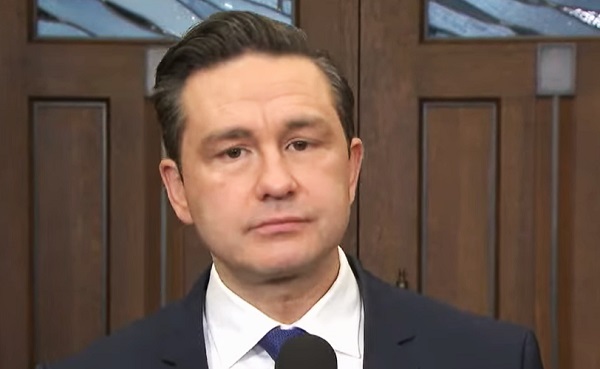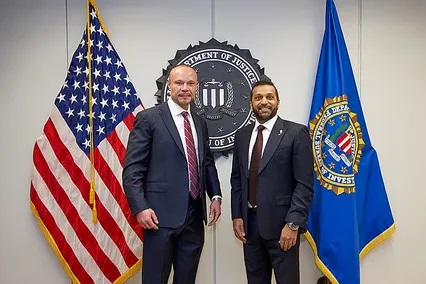International
Poilievre rebukes Trump for suggesting Canada should become 51st US state

From LifeSiteNews
The Conservative Party leader promised that the country will not be annexed by ‘economic force’ as threatened by U.S. President-elect Donald Trump.
Conservative Party of Canada leader Pierre Poilievre, and likely soon be the next Prime Minister, said the nation will “never” become a U.S. “state” in a firm rebuke to U.S. President-elect Donald Trump, who threatened to annex Canada by “economic force.”
In a statement posted Tuesday to X, Poilievre shot back at Trump’s loose remarks that Canada would become the 51st state, saying he will “put Canada first.”
“Canada will never be the 51st state. Period. We are a great and independent country,” Poilievre wrote in his statement.
“We are a great and independent country. We are the best friend to the U.S. We spent billions of dollars and hundreds of lives helping Americans retaliate against Al-Qaeda’s 9/11 attacks. We supply the U.S. with billions of dollars of high-quality and totally reliable energy well below market prices. We buy hundreds of billions of dollars of American goods.”
Poilievre added that when it comes to Canada on the world stage being perceived as weak, it’s due to “Our weak and pathetic NDP-Liberal government has failed to make these obvious points.”
“I will fight for Canada. When I am Prime Minister, we will rebuild our military and take back control of the border to secure both Canada and the U.S. We will take back control of our Arctic to keep Russia and China out,” he wrote.
Trump, speaking Tuesday from Mar-a-Lago, said rather brazenly he was considering using “economic force” to make Canada the 51st U.S. state.
He claimed that there is a $200 billion trade deficit between Canada and the U.S. regarding spending on “subsidies” and the fact the U.S. military is there to also “protect Canada.”
Trump’s remarks set off a firestorm of commentary on X from leftist and right-leaning Canadians alike.
However, Canadians are firmly opposed to the idea of their nation ever becoming a new U.S. state. A recent poll show that Canadians overwhelmingly reject the idea of Canada ever becoming the “51st state” as Trump said. In total, 82 percent are opposed to the idea, with 13 percent being in favor.
Prime Minister Justin Trudeau, who announced Monday that he intends to resign as Liberal Party leader and thus PM, had this to say regarding Trump’s comments.
“There isn’t a snowball’s chance in hell that Canada would become part of the United States. Workers and communities in both our countries benefit from being each other’s biggest trading and security partner,” he wrote Tuesday on X.
As for Trudeau, he was approved by Governor General Mary Simon to prorogue parliament until March 24. This means, for the time being, he is still serving as PM, but all parliamentary business has been stopped.
The Liberal Party will now hold a leadership race to choose a new leader, who will by default become Canada’s next Prime Minister.
International
Dan Bongino to depart FBI

FBI Deputy Director Dan Bongino confirmed Wednesday that he will leave the bureau in January, putting an end to days of speculation about his future inside the agency and signaling a short tenure that was always viewed as transitional. Bongino announced his departure in a post on X, thanking President Trump, Attorney General Pam Bondi, and FBI Director Kash Patel for what he described as “the opportunity to serve with purpose.” “I will be leaving my position with the FBI in January,” Bongino wrote, adding that he was grateful “most importantly” to the American people “for the privilege to serve you.” He closed the message with a patriotic sendoff: “God bless America, and all those who defend Her.”
The announcement followed reporting that Bongino had already begun quietly preparing his exit. According to multiple people familiar with the situation, Bongino told confidants he planned to formally step down early in the new year and would not be returning to FBI headquarters this month. Several sources said he had informed members of his team and senior bureau officials of a tentative plan to go public with his decision in mid-December, and that some of his personal belongings had already been cleared from his office as of last week.
Bongino’s move did not appear to catch the White House off guard. Prior to the public confirmation, President Trump was asked about reports of Bongino’s departure and offered warm praise, telling reporters that Bongino “did a great job” at the FBI and suggesting he may want to return to broadcasting, where he built a large national following before entering government service. Bongino, a former Secret Service agent and longtime conservative commentator, joined the FBI leadership team as part of Trump’s broader effort to reshape federal law enforcement leadership, a mission that allies say will continue under Patel and Bondi even after Bongino’s exit early next year.
Automotive
Ford’s EV Fiasco Fallout Hits Hard


From the Daily Caller News Foundation
I’ve written frequently here in recent years about the financial fiasco that has hit Ford Motor Company and other big U.S. carmakers who made the fateful decision to go in whole hog in 2021 to feed at the federal subsidy trough wrought on the U.S. economy by the Joe Biden autopen presidency. It was crony capitalism writ large, federal rent seeking on the grandest scale in U.S. history, and only now are the chickens coming home to roost.
Ford announced on Monday that it will be forced to take $19.5 billion in special charges as its management team embarks on a corporate reorganization in a desperate attempt to unwind the financial carnage caused by its failed strategies and investments in the electric vehicles space since 2022.
Cancelled is the Ford F-150 Lightning, the full-size electric pickup that few could afford and fewer wanted to buy, along with planned introductions of a second pricey pickup and fully electric vans and commercial vehicles. Ford will apparently keep making its costly Mustang Mach-E EV while adjusting the car’s features and price to try to make it more competitive. There will be a shift to making more hybrid models and introducing new lines of cheaper EVs and what the company calls “extended range electric vehicles,” or EREVs, which attach a gas-fueled generator to recharge the EV batteries while the car is being driven.
Dear Readers:
As a nonprofit, we are dependent on the generosity of our readers.
Please consider making a small donation of any amount here.
Thank you!
“The $50k, $60k, $70k EVs just weren’t selling; We’re following customers to where the market is,” Farley said. “We’re going to build up our whole lineup of hybrids. It’s gonna be better for the company’s profitability, shareholders and a lot of new American jobs. These really expensive $70k electric trucks, as much as I love the product, they didn’t make sense. But an EREV that goes 700 miles on a tank of gas, for 90% of the time is all-electric, that EREV is a better solution for a Lightning than the current all-electric Lightning.”
It all makes sense to Mr. Farley, but one wonders how much longer the company’s investors will tolerate his presence atop the corporate management pyramid if the company’s financial fortunes don’t turn around fast.
To Ford’s and Farley’s credit, the company has, unlike some of its competitors (GM, for example), been quite transparent in publicly revealing the massive losses it has accumulated in its EV projects since 2022. The company has reported its EV enterprise as a separate business unit called Model-E on its financial filings, enabling everyone to witness its somewhat amazing escalating EV-related losses since 2022:
• 2022 – Net loss of $2.2 billion
• 2023 – Net loss of $4.7 billion
• 2024 – Net loss of $5.1 billion
Add in the company’s $3.6 billion in losses recorded across the first three quarters of 2025, and you arrive at a total of $15.6 billion net losses on EV-related projects and processes in less than four calendar years. Add to that the financial carnage detailed in Monday’s announcement and the damage from the company’s financial electric boogaloo escalates to well above $30 billion with Q4 2025’s damage still to be added to the total.
Ford and Farley have benefited from the fact that the company’s lineup of gas-and-diesel powered cars have remained strongly profitable, resulting in overall corporate profits each year despite the huge EV-related losses. It is also fair to point out that all car companies were under heavy pressure from the Biden government to either produce battery electric vehicles or be penalized by onerous federal regulations.
Now, with the Trump administration rescinding Biden’s harsh mandates and canceling the absurdly unattainable fleet mileage requirements, Ford and other companies will be free to make cars Americans actually want to buy. Better late than never, as they say, but the financial fallout from it all is likely just beginning to be made public.
- David Blackmon is an energy writer and consultant based in Texas. He spent 40 years in the oil and gas business, where he specialized in public policy and communications.
-

 Community2 days ago
Community2 days agoCharitable giving on the decline in Canada
-

 Alberta1 day ago
Alberta1 day agoCanada’s New Green Deal
-

 Business1 day ago
Business1 day agoCanada’s recent economic growth performance has been awful
-

 armed forces1 day ago
armed forces1 day agoOttawa’s Newly Released Defence Plan Crosses a Dangerous Line
-

 Alberta1 day ago
Alberta1 day agoAlberta’s huge oil sands reserves dwarf U.S. shale
-

 Health1 day ago
Health1 day agoSaskatchewan woman approved for euthanasia urged to seek medical help in Canada rather than US
-

 Business1 day ago
Business1 day agoCOP30 finally admits what resource workers already knew: prosperity and lower emissions must go hand in hand
-

 Health1 day ago
Health1 day agoCanadian gov’t considers sharing census data on gender-confused children






